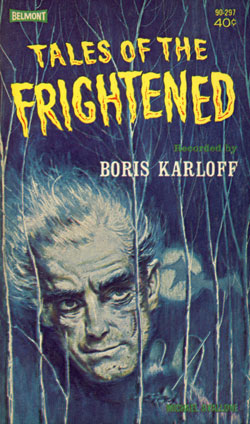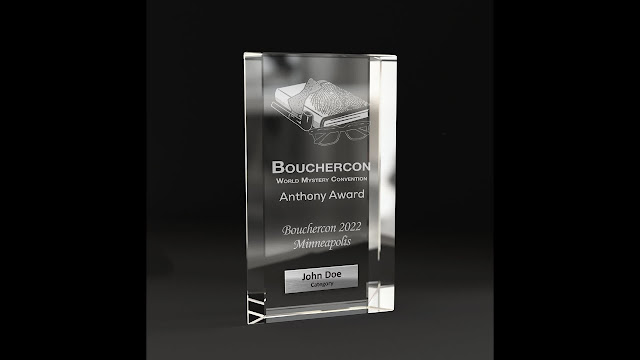Further reviewing the small slew of late '50s f/sf/h fiction magazines begun with this post: Fantasy/Horror/SF fiction magazine issues from the 1950s fantastica "End of Summer": THE MAGAZINE OF FANTASY AND SCIENCE FICTION April 1958 edited by "Anthony Boucher"; FANTASTIC April 1959 edited by Cele Goldsmith; FANTASTIC UNIVERSE April 1958 edited by Hans Stefan Santesson; TALES OF THE FRIGHTENED August 1957 edited by Lyle Kenyon Engel; SCIENCE FANTASY April 1958 edited by John Carnell (and INSIDE SF's F&SF/Mercury Press parody issue/September 1958, edited by Ron Smith, and MACABRE, Summer 1958, edited by Joseph Payne Brennan)
and continuing with these: Short Story Wednesday: Kit Reed, Margaret St. Clair, William F. Nolan, Avram Davidson, Richard Wilson, and others: April 1958 fantasy (and related) stories from THE MAGAZINE OF FANTASY AND SCIENCE FICTION and FANTASTIC UNIVERSE (part 2)
SSW: 1959 fantasy magazine fiction: Part 3: Kate Wilhelm, Harlan Ellison, Marion Zimmer Bradley, Gordon Dickson, Edward Wellen, Arthur & Irwin Porges: FANTASTIC, April 1959, edited by Cele Goldsmith (Lalli)
Note that the loving care with which this cover has been put together, as noted previously, includes attributing Poul Anderson's story to Mack Reynolds's pseudonym, and vice verse, and spelling Poul as "Paul"...also, an utter lack of page numbers on the issue's table of contents can't have helped a newsstand-browser's confidence...
But first, the two most famous stories in our April 1958 issue of F&SF: Fritz Leiber's cover story, "A Deskful of Girls" and the only story to follow it, Brian Aldiss's "Poor Little Warrior!".
So, Leiber's "A Deskful of Girls" pretty much blew my mind as a teenager, first reading it around 14 or so years old in The Best of Fritz Leiber most likely, the 1974 volume that was released perhaps a bit prematurely, but Leiber at his best might well've been the best writer to come out of the fantasy/sf magazine community, ahead of such inspirations as Lovecraft and Heinlein, and ahead of such peers as Bradbury and Sturgeon and heirs such as Le Guin and Emshwiller and Russ, and his almost direct colleague in Lovecraft-mentorship (and HPL-transcendence), Robert Bloch. Rereading it this last week doesn't impress me much less, despite familiarity, and all the others, Norman Mailer, Joyce Carol Oates and all, who have similarly traced the passage through her later life that "Marilyn Monroe" took...though Leiber published his account of a rather obvious Monroe analog in 1958, with her rapacious "therapist"/"analyst" and the genuinely exploitive as well as supernatural means he has discovered for controlling her and other women "patients"--removing aspects of themselves through a kind of ritual that pulls parts of their selves away from them, in a kind of psychic yet tangible self that the story's protagonist refers to as "ghostgirls." The tangible selves, wispy as their physical form is, can be used by the villain of the piece in several fashions, explicitly and implicitly addressed, when he doesn't simply take them from his file drawer and toy with them, or show them off, as to his somewhat different male temporary victim, Leiber's protagonist, hired by an actor, whose relation with the Monroe-correspondent resembles Joe DiMaggio's post-divorce interaction, to discover what's going on with his ex-wife and this extortionist. The vicious psychologist/parapsychologist has his run-in with the Monroe character, and it doesn't go as he might've expected. It's a hell of story, and is by the slimmest thread tied into Leiber's Change War stories (a quick reference to some of the supernatural technology several characters employ being provided by the time-travelers involved in the the truer CW stories), but it's mostly a remarkably grounded horror story for its time, feminist in approach even when even the more sympathetic male characters fail to fully appreciate the what some women can and will do, in the face of various sorts of exploitation or paternalistic "protection"...Leiber coming from an acting family, himself mostly raised by the women in his family, and having a brief, peripheral Hollywood career himself might not've hurt his insights here.
While the Aldiss story is good early work by him, an interesting mix of what Boucher correctly suggests is a Bradburyian lavishness in the prose (but with a lighter and more jazzily discursive touch than Bradbury usually managed), but also a kind of rather contemporary consideration of what might drive a married man to go back in time to be a "Poor Little Warrior!", hunting a brontosaurus on what amounts to a potted safari...but one that isn't quite as foolproof as one might desire in a distracting vacation...in his case to help him forget about his failing relation with his wife, which is touched upon in terms that take the story in a vaguely Updike or Amis or Philip Roth direction (rather than the more thoroughly mournful flavor John Cheever gave such matters in fantasies such as "The Enormous Radio"). This is not the story that will make me forget such early Aldiss as "Let's Be Frank", but I can see why it's an old favorite of many.
This ever-more impressive F&SF issue can be read here. While the highly uneven, but not altogether negligible latter issue of Tales of he Frightened can be read here.
Tales of the Frightened was one of three fiction magazines that Lyle Kenyon Engel and Republic Features Syndicate launched in 1957, along with one in 1956, all four seeing only two issues each, and each with a somewhat better covers on their first issues than their second issues would offer:

TotF, at least, was tied to an essentially stillborn syndicated radio series of short fillers, read by Boris Karloff, written by Michael Avallone...who probably was the actual editor of at least the two fantastica magazines (Engel is listed in them as Editorial Director), even as Avallone had been credited as editor of the two slightly earlier issues (1956-57) of Private Investigator Detective Magazine, both featuring Avallone's series detective Ed Noon (and please see below for Avallone's reported account), and Avallone also the likely author of some of the stories bylined by the utterly obscure among contributors to the magazines...when they weren't by other old pros such as Mack Reynolds, also in hiding. (American Agent apparently had a similarly planned unsuccessful radio run, getting as far as hiring veteran actor Lee Bowman as lead, according to the inside and outside back-cover blurbs for six planned Republic Features syndicated radio series--the others non-fictional or joke-laden in content--but as far as I know at this point, none of the others saw even raw recordings for the eventual initial pair of record albums, nor the book collecting the prose form of the radio vignettes, that the horror package would eventually produce). At least one report online has Republic Features Syndicate going under in '57, hence the end of the magazines (while Peter Enfantino reports at the link below that Avallone recalled a distributor's workforce-strike killed them--which seems unlikely, given the haphazard packaging of the second issues, unless the strike predated their preparation, but perhaps Avallone misremembers the stock-speculation-driven collapse of the dominant magazine distributor of the time, the American News Co.) and lack of radio penetration for whatever was actually recorded. Engel went on to decades of book packaging, Avallone to decades of writing. And the single vignettes in both issues of TotF attributed (more or less) to Karloff are Avallone's, from the radio vignette series and as collected in the book.
And this is apparently the first edition of the Avallone book (1963):
and these the Karloff recordings, the Mercury LP "Volume 1", also from '63: Side 1
And Volume 2, complete:
The stories I've read first in the Frightened issue have run to those by my old favorites, unsurprisingly...crime-fiction writer (and more than occasional horror-fiction writer for such CF magazines as Alfred Hitchcock's Mystery Magazine in its early decades) C. B. Gilford, whose story is this issue isn't the only one to cross-over from crime fiction to horror. "The Lucky Coffin" of the title confers a sort of immortality, apparently, on those wise enough to have purchased it...including the parsimonious, cantankerous (to say the least) and generally unpleasant uncle of the protagonist, and his long-suffering fiancee, and what it takes to make their dreams come to fruition. A fine and cheerful story, about the morally bankrupt.
Even better, and dealing with a similar class of anti-hero, is Poul Anderson's "Mr. Tiglath", the name offered by a dealer in persons trapped, like genies, in bottles of various sorts, and whom can be put to various uses. It's unsurprisingly best not to make such deals, even if Mr. Tiglath might not be Satan himself so much as an associated figure, and eventually meeting the prices one might pay. The story has excellent detail and even makes a reasonable case why the protagonist might be foolhardy enough to take the chance.
The attributed Mack Reynolds vignette, the joke-story "Dead End", is pun-laden enough so that Isaac Asimov and co-editors snapped it up for Microcosmic Tales, largely devoted to vignettes, but as Peter Enfantino similarly noted a dozen years ago, it's rather an anemic pun, to not quite make another myself, even if it is one of the few stories here to ever be reprinted. The other Reynolds story, attributed to "Mark Mallory", is a slightly clumsy bit of supernatural hugger-mugger called "The Man Who Stole His Body", in which the spirit of an accomplished surgeon strikes a desperate bargain with his guide on the way to an afterlife, and tries to convince another surgeon on staff at his hospital to perform extreme measures to keep his potentially dead body alive. Quite beyond the supernatural elements of the story, the narrative would like us to accept that a modern surgical suite would have rusty, as opposed to perhaps recently-used and in need of cleaning, instruments at tableside, or that either the rushed living or the living dead doctor would look upon the seconds, at most, to pull on surgical gloves to make a lick of difference, even while eschewing scrubbing up for several minutes beforehand. It verges on being a clever conceit of a story, but one can see why Reynolds stuck a pseudonym on this one over even the mildly clever if forced pun story.
The Avallone vignette in this issue, headnoted with an advisory that the radio series was meant to be broadcast as The Frightened, is attributed only to Karloff, as if he were writer as well as narrator. As reprinted in the various formats of the Avallone collection Tales of the Frightenend, this one leads off the book, under the title "The Man in the Raincoat"...we are, I think, supposed to realize the strange man in the titular coat has an oddly-shaped umbrella somewhat suggestive of a scythe, but that is not spelled out in the story, such as it is as published here (or as recorded). The apparently two other Avallone stories here, one mildly reprinted, might well average better, and I will see soon.


.jpeg)








